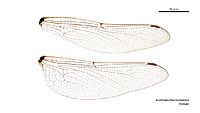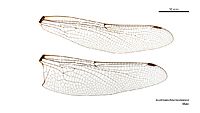Tasmanian darner facts for kids
Quick facts for kids Tasmanian darner |
|
|---|---|
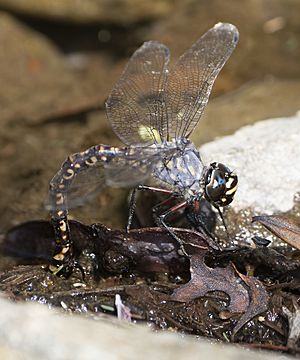 |
|
| Female laying her eggs | |
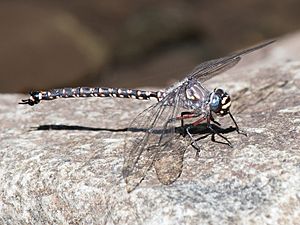 |
|
| Male | |
| Conservation status | |
| Scientific classification |
|
| Kingdom: | Animalia |
| Phylum: | Arthropoda |
| Class: | Insecta |
| Order: | Odonata |
| Infraorder: | Anisoptera |
| Family: | Telephlebiidae |
| Genus: | Austroaeschna |
| Species: |
A. tasmanica
|
| Binomial name | |
| Austroaeschna tasmanica Tillyard, 1916
|
|
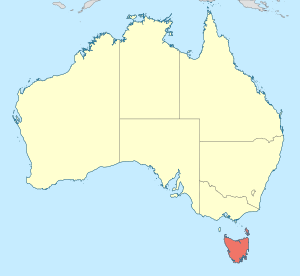 |
|
| Script error: The function "autoWithCaption" does not exist. | |
Script error: No such module "Check for conflicting parameters".
The Tasmanian darner (Austroaeschna tasmanica) is a very large type of dragonfly. It belongs to a family called Telephlebiidae, which includes some of the biggest dragonflies in the world! You can find this special insect only in Tasmania, Australia.
This dragonfly was first described by a scientist named Robert Tillyard in 1916. It likes to live near streams and rivers.
Contents
What's in a Name?
Sometimes, these dragonflies are called "hawkers." But the name "darner" is quite interesting! It comes from how the female dragonfly lays her eggs. Her abdomen (the long back part of her body) looks a bit like a sewing needle. When she lays her eggs, she uses a special tool called an ovipositor to cut into a plant stem. This makes it look like she's "darning" or sewing the plant.
What Does It Look Like?
The Tasmanian darner is a strong, dark dragonfly. It has a very dark body with lighter markings. It looks quite similar to another dragonfly called the lesser Tasmanian darner (Austroaeschna hardyi).
Reproduction and Life Cycle
Female Tasmanian darners lay their eggs in plant stems near water. They use their special ovipositor to make a small cut and place the eggs inside. After the eggs hatch, young dragonflies, called nymphs, live in the water. They grow and change there until they are ready to become adult dragonflies.
Conservation Status
The Tasmanian darner is listed as "Least Concern" by the IUCN (International Union for Conservation of Nature). This means that, for now, there are plenty of them, and they are not in danger of disappearing.
Gallery
See also
 In Spanish: Austroaeschna tasmanica para niños
In Spanish: Austroaeschna tasmanica para niños
 | John T. Biggers |
 | Thomas Blackshear |
 | Mark Bradford |
 | Beverly Buchanan |



